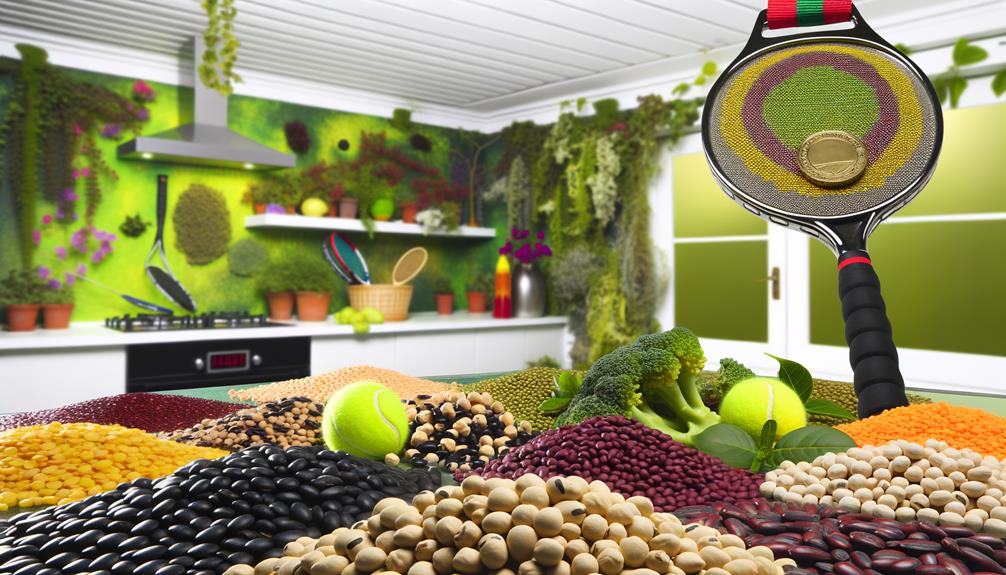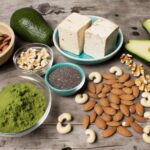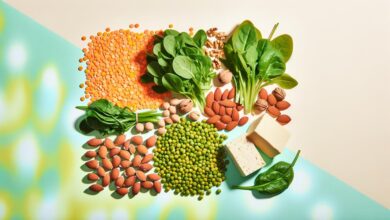In your quest for Olympic gold, you wouldn't fuel a steam engine with twigs when it's designed for coal; similarly, as a vegan athlete, you can't expect to reach peak performance without the proper fuel. Legumes are the heavyweight champions in the plant-based arena, offering a knock-out combination of high-quality protein, essential amino acids, and a wealth of nutrients that are critical for muscle recovery and growth. You're constantly pushing your body to its limits, and the right nourishment is crucial to ensure you're not only meeting your daily energy demands but also supporting long-term health and digestive well-being. Yet, the significance of legumes extends beyond their impressive nutritional profile. As you incorporate them into your diet, you might discover a synergy between these humble beans and your athletic prowess, hinting at deeper cultural and environmental impacts worthy of exploration. What if embracing legumes is more than a personal health choice, but a stride towards a more sustainable future in sports nutrition?
Key Takeaways
- Legumes provide high-quality plant protein and essential amino acids necessary for muscle repair and growth.
- Including a variety of legumes ensures a more complete amino acid profile and supports protein complementation.
- Legumes fuel workouts with complex carbohydrates and aid in muscle fiber repair and growth.
- Legumes offer nutrient-dense energy for sustaining physical activity and support digestive health through their fiber-rich profile.
High-Quality Plant Protein
As a vegan athlete, incorporating legumes into your diet ensures you're getting high-quality plant protein essential for muscle repair and growth. This isn't just about maintaining your own strength and health; it's about embodying a lifestyle that respects the earth and all its inhabitants. You're setting a powerful example of how one can thrive on a plant-based diet while pursuing the demanding goals of vegan bodybuilding.
Legumes, such as lentils, chickpeas, and beans, are powerhouses of nutrition, packed with fiber, iron, and essential amino acids that are the building blocks for protein synthesis. They're not only good for you; they're good for the planet, offering a sustainable protein source that takes less of a toll on our environment than animal-based proteins.
Amino Acid Profile
Understanding the amino acid profile of legumes is crucial because your muscles need all essential amino acids to repair and grow effectively. Legumes stand out in the plant kingdom for their rich lysine content, an amino acid often limited in other plant-based foods. As a vegan athlete, you're not just nourishing yourself; you're also setting an example of compassionate and sustainable eating. It's about serving your body and the planet, all while pushing the boundaries of athletic performance.
When you include a variety of legumes in your diet—such as lentils, chickpeas, and black beans—you're ensuring a more complete amino acid profile. This is where protein complementation becomes a key strategy. It involves combining different plant foods that, when eaten together, provide a full range of essential amino acids. Think rice and beans or hummus with whole wheat pita; these combinations are not only culturally rich but also nutritionally synergistic.
Muscle Recovery and Growth
In the realm of muscle recovery and growth, legumes are a powerhouse, providing the necessary proteins to rebuild your tissues after strenuous workouts. As you push your body to its limits, it's crucial to nourish it with foods that not only replenish your energy but also support metabolic efficiency. Legumes, with their complex carbohydrates, play a significant role in this, steadily fueling your workouts and aiding in the repair and growth of muscle fibers.
Moreover, legumes are rich in nutrients that are vital for inflammation reduction, a key factor in recovery. Their abundance of antioxidants and anti-inflammatory compounds helps mitigate the stress exercise places on your body. This not only accelerates healing but also prepares you for your next training session, ensuring that you're able to serve others and yourself through consistent, optimal performance.
Nutrient-Dense Energy Sources
Building on the recovery benefits of legumes, these staples also offer vegan athletes an abundance of nutrient-dense energy, crucial for sustaining long periods of physical activity. As you're aware, maintaining energy levels is paramount for your performance, and legumes are a powerhouse in this regard. They aren't just a symbol of compassion and sustainability; they're a practical choice for fueling your body.
Consider these compelling reasons to include legumes in your diet:
- Complex Carbohydrates: Legumes are rich in complex carbohydrates, the kind that provides a slow and steady release of energy. This is beneficial for carbohydrate loading, a strategy you might employ before endurance events to maximize your energy reserves.
- Plant-Based Protein: They're packed with protein, essential for muscle repair and growth, helping you stay strong and resilient as you serve others through your athletic endeavors.
- Antioxidant Properties: The antioxidant properties of legumes combat oxidative stress, ensuring your body can recover faster and perform at its peak.
Digestive Health Benefits
Your gut health can significantly benefit from the fiber-rich profile of legumes, aiding in digestion and enhancing nutrient absorption. This isn't just about comfort or avoiding the discomfort of digestive issues; it's about creating an internal environment where you can thrive. The fiber content in legumes acts as a prebiotic, providing nourishment for your gut flora. These beneficial bacteria play a pivotal role in your overall well-being, influencing everything from your immune system to your mood.
When you're training hard and your body is constantly being pushed to its limits, it's vital to have a digestive system that's running smoothly. Legumes offer a gentle, natural way to support this. They help to keep things moving, reducing the risk of constipation, which can be a concern for athletes who have high protein needs but may not get enough fiber.
Frequently Asked Questions
How Do Legumes Impact Iron Absorption in Vegan Athletes, Considering the Non-Heme Iron They Contain?
You'll boost iron absorption from legumes by combining them with iron enhancers like vitamin C, and by using cooking techniques that reduce phytate, ensuring you're well-nourished to serve others effectively.
Can Excessive Consumption of Legumes Lead to Any Negative Health Effects for Athletes, Such as Inflammation or Joint Discomfort?
You are what you eat, but too much of a good thing can backfire. Excessive legume intake may trigger allergies or digestive discomfort, hindering your service to others with unnecessary health woes.
Are There Specific Types of Legumes That Are More Beneficial for Endurance Athletes Compared to Strength Athletes?
You'll find that adapting legume variety and protein timing to your training type maximizes benefits—endurance athletes may prefer lentils, while strength-focused individuals often choose chickpeas for their robust protein profile.
How Do Cooking Methods Affect the Nutritional Value of Legumes for Vegan Athletes?
Cooking legumes unlocks a symphony of nutrients, enhancing their digestibility. You'll preserve their nutrient retention, serving your body's needs while fostering a culture of mindful, plant-based nourishment for optimal athletic performance.
What Are the Best Ways to Combine Legumes With Other Foods to Enhance Overall Performance and Energy Levels in Vegan Athletes?
You'll boost your performance by pairing legumes with grains, optimizing amino acid profiles for muscle repair. This thoughtful nutrition approach serves your body's needs, fueling you with sustained energy for athletic excellence.







